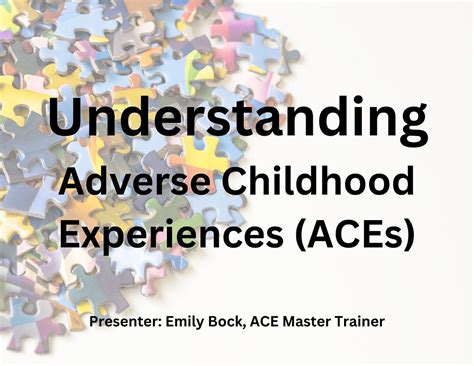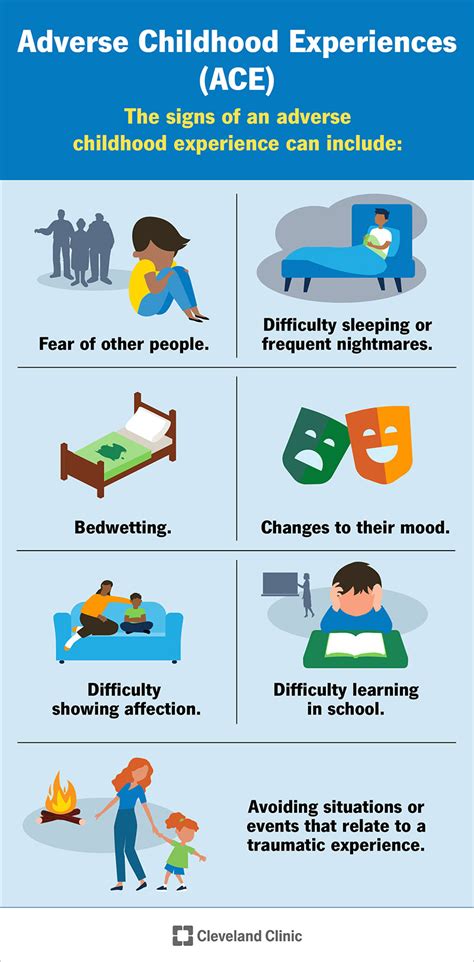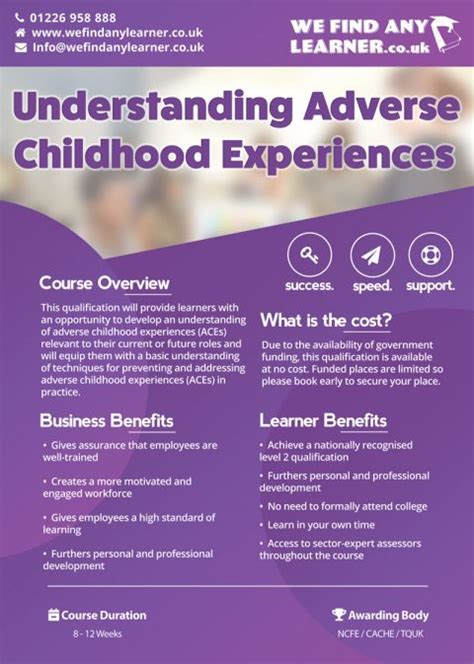Intro
Discover the lasting impacts of Adverse Childhood Experiences (ACEs) on mental health, trauma, and resilience, exploring effects on brain development, stress response, and long-term well-being, with insights into ACEs study findings and prevention strategies.
The impact of childhood experiences on adult life has been a topic of interest for many years. However, it wasn't until the Adverse Childhood Experiences (ACE) Study that the full extent of these effects became clear. The ACE Study, conducted by the Centers for Disease Control and Prevention (CDC) and Kaiser Permanente, revealed a significant link between childhood trauma and various health problems later in life. This groundbreaking research has far-reaching implications for fields such as psychology, medicine, and social work. As we delve into the world of ACEs, it becomes apparent that understanding and addressing these experiences is crucial for promoting healthy development and preventing long-term damage.
The ACE Study surveyed over 17,000 adults, asking about their childhood experiences and current health status. The results showed that nearly two-thirds of participants had experienced at least one adverse childhood event, such as physical or emotional abuse, neglect, or household dysfunction. These experiences were found to have a profound impact on both physical and mental health, increasing the risk of conditions like depression, anxiety, and chronic diseases like heart disease and diabetes. The study's findings have significant implications for how we approach healthcare, education, and social services, highlighting the need for a more comprehensive and trauma-informed approach.
The importance of addressing ACEs cannot be overstated. By understanding the effects of childhood trauma, we can work towards creating a more supportive and nurturing environment for children, reducing the risk of long-term damage and promoting healthy development. This requires a multidisciplinary approach, involving professionals from various fields, including healthcare, education, and social work. By working together, we can develop effective strategies for preventing and mitigating the effects of ACEs, ultimately creating a brighter future for generations to come.
Understanding Adverse Childhood Experiences

These experiences can be incredibly challenging for children to navigate, and their effects can persist long into adulthood. The ACE Study found that the more ACEs an individual experienced, the higher their risk of developing various health problems, including mental health disorders, chronic diseases, and even early death.
The ACE Pyramid
The ACE Pyramid is a useful model for understanding the relationship between ACEs and their effects on adult health. The pyramid consists of three tiers: 1. **Social and Environmental Factors**: This tier includes factors such as poverty, racism, and social isolation, which can contribute to the development of ACEs. 2. **Adverse Childhood Experiences**: This tier represents the traumatic events themselves, such as physical or emotional abuse. 3. **Health and Behavioral Outcomes**: This tier includes the various health problems and behavioral issues that can result from ACEs, such as depression, anxiety, and substance abuse.By understanding the ACE Pyramid, we can better appreciate the complex interplay between social and environmental factors, ACEs, and their effects on adult health.
The Effects of Adverse Childhood Experiences

These effects can be mitigated with proper support and intervention. By providing children with a nurturing environment, stable relationships, and access to resources and services, we can help reduce the risk of long-term damage.
Resilience and Post-Traumatic Growth
While ACEs can have a profound impact on adult health, it's essential to recognize that many individuals are resilient and can experience post-traumatic growth. This refers to the ability to not only survive but thrive after experiencing trauma. Factors that contribute to resilience and post-traumatic growth include: * **Social Support**: Having a strong support network of family, friends, and community members. * **Emotional Regulation**: Being able to manage and regulate emotions in a healthy way. * **Coping Mechanisms**: Developing healthy coping strategies, such as exercise, mindfulness, or creative pursuits. * **Meaning-Making**: Finding meaning and purpose in life, despite the trauma experienced.By fostering resilience and promoting post-traumatic growth, we can help individuals heal and recover from ACEs, reducing the risk of long-term damage and promoting overall well-being.
Addressing Adverse Childhood Experiences

By working together to address ACEs, we can create a more supportive and nurturing environment for children, reducing the risk of long-term damage and promoting healthy development.
Creating a Trauma-Informed Environment
Creating a trauma-informed environment is essential for supporting individuals who have experienced ACEs. This involves: * **Understanding Trauma**: Educating oneself about the effects of trauma and how it can impact individuals. * **Establishing Trust**: Building trust with individuals who have experienced trauma, through empathy, active listening, and validation. * **Providing Safety**: Creating a safe and secure environment, free from triggers and threats. * **Fostering Connection**: Encouraging social connection and community engagement, to help individuals build strong relationships and support networks. * **Promoting Self-Care**: Encouraging individuals to engage in self-care activities, such as exercise, mindfulness, or creative pursuits.By creating a trauma-informed environment, we can help individuals feel safe, supported, and empowered, reducing the risk of long-term damage and promoting overall well-being.
Conclusion and Next Steps

We invite you to share your thoughts and experiences with us, and to take action in your own community to address ACEs. Together, we can create a brighter future for generations to come.
What are Adverse Childhood Experiences (ACEs)?
+Adverse Childhood Experiences (ACEs) refer to traumatic events that occur during childhood, typically between the ages of 0 and 18, such as physical or emotional abuse, neglect, or household dysfunction.
How do ACEs affect adult health?
+ACEs can increase the risk of various health problems, including mental health disorders, chronic diseases, and substance abuse, due to the impact of trauma on brain development, stress regulation, and coping mechanisms.
What can be done to address ACEs?
+Addressing ACEs requires a comprehensive and multidisciplinary approach, including trauma-informed care, early intervention, parent-child therapy, community-based programs, and policy changes that address the root causes of ACEs.
How can I get involved in addressing ACEs in my community?
+You can get involved by educating yourself about ACEs, volunteering with local organizations that support families and children, advocating for policy changes, and providing trauma-informed care to those affected by ACEs.
What resources are available for individuals affected by ACEs?
+Resources include counseling services, support groups, and community-based programs that provide trauma-informed care, as well as online resources and hotlines that offer guidance and support.
